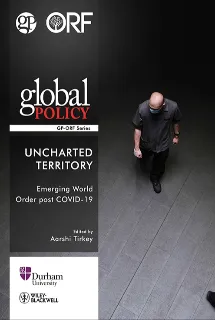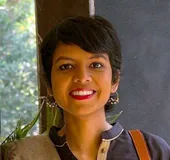Editor’s Note
Within a span of a few months, the novel coronavirus has spread across the globe and firmly established itself as the biggest disease outbreak since the 1918 Spanish flu. No one could foresee that the new decade of the twenty-first century would begin with a rapidly unfolding pandemic that indiscriminately attacks countries, both rich and poor. The impact of COVID-19 will be pervasive; it will affect all segments of our lives, including politics, society, governance, economy, trade and development. The disease’s most profound and consequential impact, however, will be felt in its ability to reshape the global order as it stands.
To be sure, the global order was already undergoing a slow and steady metamorphosis. The rise of nationalist movements, protectionist sentiments, de-globalisation forces and a lack of faith in multilateralism were indicative of a departure from the established norms of global engagement. The escalation of great power rivalries between the US and China—with countries caught between the so-called American exceptionalism and Chinese revisionism—has further accentuated this departure. It remains to be seen if the onslaught of COVID-19 will hasten the denouement of these processes or push the world to an entirely new trajectory altogether. What is certain is that similar to the Great Depression, World War II and the 2008 financial crisis, the pandemic will also be a watershed moment in the history of humankind.
The two most prominent hypotheses of a post-COVID-19 world can be simplified in the following scenarios: first, is the emergence of a world order where China reigns supreme in a new unipolar world, or the second, where the world collectively shuns China for its “Chernobyl moment” and embarks on a different global chapter. It is perhaps too early to forecast what the global order may look like once the pandemic has moved past its worst stage. Nonetheless, a section-wise study of elements that impact geopolitics, multilateralism, geoeconomics and geotechnology can help build a clearer picture of what we may come to expect in the future. As global actors are pushed deeper into ‘uncharted territory’, this volume of selected essays seeks to describe, investigate and critically analyse key factors that will shape the world’s journey to a post-COVID-19 era.
The first section on geopolitics examines both the theories and determinants that will contribute to shaping the new world order. The biggest perceptible challenge—exacerbated by the novel coronavirus—comes to the Western-led liberal order. The demise of Pax Americana and the changed perception towards multilateralism and globalisation demonstrate that these paradigms are not monolithic in nature. The writers recognise this fact, and posit that these structures will be reorganised to suit the order of the day. On geopolitical contestation, much of the predominant narrative focuses on binaries of either arriving at a China-led global order or going back to a US-led one. A series of events, beginning with the technology and trade war between US and China, followed by their deteriorating relations during the pandemic, could change the competition for global leadership in the 21st century. In this context, developments such as China’s concealment of the virus and the US’s abandonment of its role as a world leader are explored to discern their import and significance. Understanding the trajectory of geopolitics also calls for the need to examine how responses to the pandemic have differed by regime type. Regime types can induce geopolitical churn and vice versa; the rise of the Soviet Union propagated communism, while its collapse by the end of the Cold War saw the triumph of democracy. While these topics will be debated for years to come, the pandemic had certainly shown that irrespective of regime types, decisive leadership and state capacity are critical to shaping a suitable response to COVID-19.
The second section on multilateralism delves into the possible demise of the post- World War II global order. The institutions created in this era sought to maintain peace and security, and build a global community that worked towards progress and prosperity for all. Today, multilateral and intergovernmental organisations have become increasingly fragmented, politicised and are struggling to find relevance. Major international organisations like the United Nations, the World Health Organization (WHO) and the European Union have been criticised for failing to respond to the pandemic with the promptness and alacrity that the situation desires. The writers in this section highlight the institutional weaknesses of the WHO, as well as the concerns surrounding Beijing’s increasing footprint in multilateral institutions. Rather than invoking these reasons to abandon international institutions, these developments demonstrate the need to strengthen the underlying foundations of the global governance architecture. The importance of this cannot be emphasised enough—a global disease outbreak requires a coordinated global response. Accordingly, the crisis has galvanised regional efforts in some pockets, such as Indian Prime Minister Narendra Modi’s efforts to resurrect the SAARC, which provides a crucial case in point for continued support towards intergovernmental platforms and global institutions.
The third section on geoeconomics will look at the effect of COVID-19 on globalisation, supply chains, trade and economic relations. With closed borders, grounded flights, a decline in immigration and a massive dip in global trade, the neoliberal model of economic globalisation has suffered a severe reversal. Should this reversal become permanent, it will create more inward-looking national economies—a sharp contrast from the interconnected world that was, until recently, the natural state of affairs. The writers argue that a new form of ‘gated globalisation’ could emerge, one that is less free and less open than before. This will impact not only advanced economies, but emerging economies as well. For instance, the pandemic has drawn attention to the risks faced by emerging economies due to massive capital outflow and shortage of dollar liquidity in the region. This would require countries like India to overhaul fiscal policies and growth strategies to adapt to a less interconnected world. Closely related to geoeconomics is the resurgence of aid diplomacy, which utilises competitiveness in local industries to meet global demands for medical supplies, medical equipment and essential goods. If this forges new partnerships between countries and organisations, it will reorient foreign policy imperatives towards nations that are ready and willing to meet these demands. In focus is China’s ‘mask diplomacy’ and its diplomatic charm offensive, which has been welcomed by some and shunned by many. While China has the resources to lead medical diplomacy, the comparative advantage of other countries—such as India’s in manufacturing generic drugs—throws open the possibility of an improved global standing in a post-COVID-19 world order.
The last section on geotechnology considers the use of advanced and emerging technologies to combat COVID-19, and how increasing their use interfaces with geopolitical processes. Countries across the world have deployed mass surveillance applications—arguably, at the cost of privacy and data protection—to trace, track, detect and diagnose fresh infections before they spread further. Apart from the fact that these applications mirror the oft-criticised ‘digital authoritarianism’ of China, nations appear to be keen on learning from Beijing’s experience to fashion their own responses to the pandemic. It will be useful to explore what the boost in demand for such technology could mean for future norms on individual rights and cyberspace, which is currently the new plane of existence for mankind. Technological advancements have also spurred geopolitical contestation in emerging technologies between the US and China. The writers examine the expected decoupling between the two rivals, which is only set to become more acute due to their deteriorating bilateral relations. As technological and scientific advancements continue, new uncertainties will emerge to disrupt the extant world order. Humanity’s woes have not ended yet; there are many challenges and conflicts that could face the world as the next disaster looms beyond the COVID-19 pandemic. In the midst of a world order in flux, these uncertainties underscore the need for global cooperation more than ever.
At present, it is difficult to discern the shape, form or substance of the post COVID-19 world order. Nevertheless, by bringing together some of the best global minds to meditate on this issue, this edition aims to contribute to the expanding scholarship on COVID-19 and endeavours to inform academics, researchers, journalists and stakeholders on understanding the most pernicious, significant and world-changing event of our times.
Contents
Geopolitics
- Order at the Gates: Globalisation, Techphobia and the World Order Samir Saran
- US and China in COVID-19 Era: Engagement, Strategic Competition and Beyond Manoj Joshi
- What does COVID-19 Tell us About Democracy vs Authoritarianism? Dhruva Jaishankar
Multilateralism
- What’s Ailing the World Health Organization? Harsh V. Pant and Aarshi Tirkey
- China’s Footprint is Growing Within the United Nations Seema Sirohi
- India’s SAARC Diplomacy During the COVID-19 Crisis K. Yhome
Geoeconomics
- Gated Globalisation and Fragmented Supply Chains Jayant Sinha and Samir Saran
- COVID-19’s Reality Shock for Emerging Economies: Measures to Deal with Dependence on External Funding Alicia García Herrero and Elina Ribakova
- Exploring China’s Diplomatic Offensive in Central and Eastern Europe Amidst its ‘Mask Diplomacy’ Alicja Bachulska
Geotechnology
- COVID-19 Will Test the Limits of the Privacy Debate Shashidhar K.J.
- Separation Anxieties: US, China and Tech Interdependence Trisha Ray
- The World Must Come Together Before the Next Disaster Hits Chen Xi
The views expressed above belong to the author(s). ORF research and analyses now available on Telegram! Click here to access our curated content — blogs, longforms and interviews.

 PDF Download
PDF Download



 PREV
PREV


